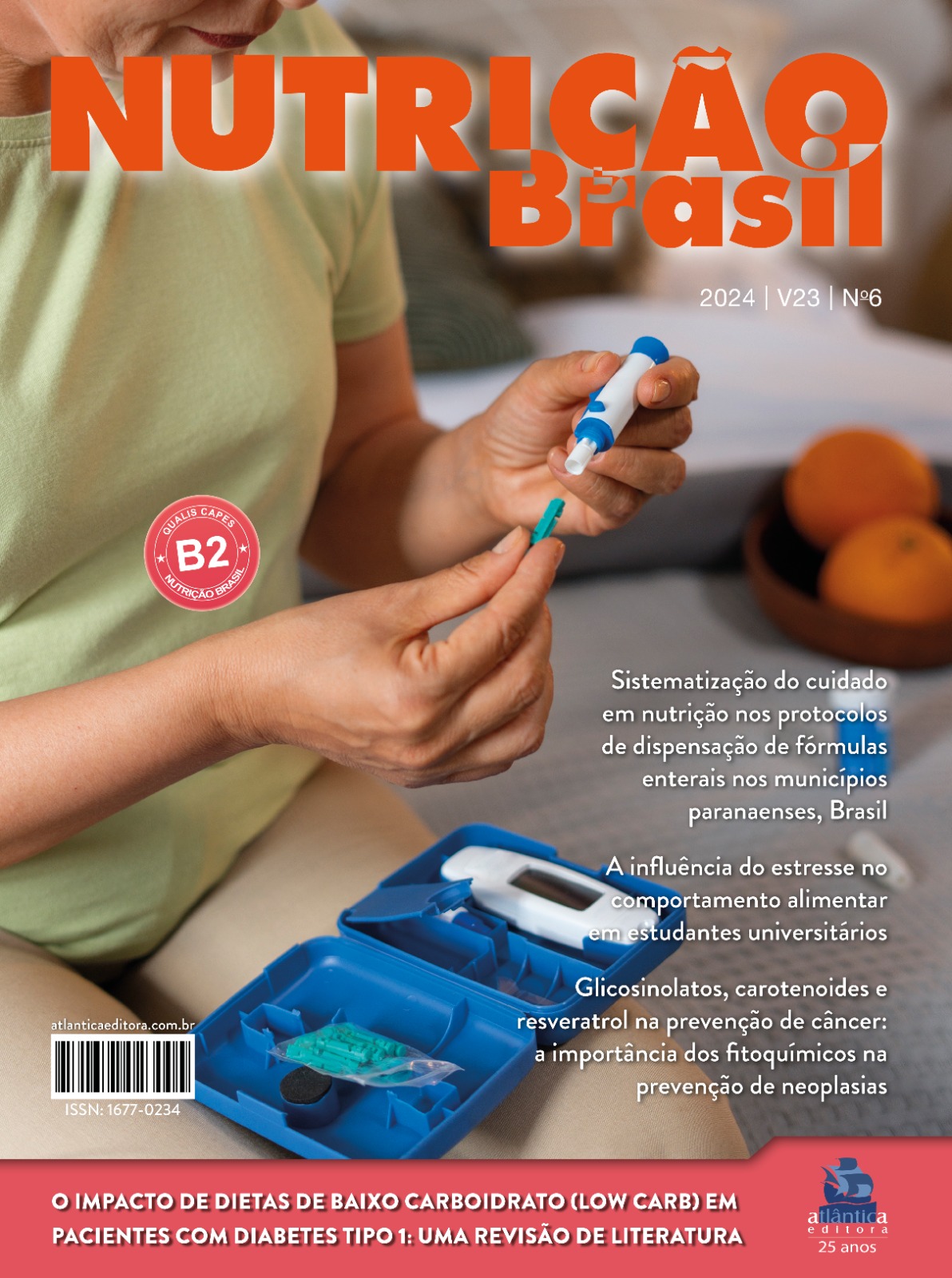The impact of low-carbohydrate diets (low carb) on patients with type 1 diabetes: a literature review
DOI:
https://doi.org/10.62827/nb.v23i6.3050Keywords:
Type 1 Diabetes; Carbohydrate-Restricted Diet; Carbohydrate.Abstract
Introduction: Low-carbohydrate diets have become popular, but there is still no consensus on their real effectiveness in different groups. Objective: A literature review was conducted on the impact of low-carbohydrate diets on patients with type 1 diabetes (T1D). Methods: Articles were retrieved from the PubMed database, published between 2021 and 2025, using the keywords “diabetes” and “low carbohydrate diet.” Only clinical trials (randomized and non-randomized) with open access to the full text in English were included. The analysis followed PRISMA criteria to ensure methodological quality. Results: Initially, 262 articles were identified, and 11 were selected for analysis. A significant variation was observed across the studies, including differences in patient age, diet duration, and T1D diagnosis time. Overall, the studies indicated an improvement in hemoglobin A1c after adopting the low-carb diet, although some divergent results question this finding. No significant changes were observed in the lipid profile of participants, but some mineral deficiencies, such as calcium and magnesium, were noted. Conclusion: Although some studies suggest benefits in glycemic control with the low-carb diet, there is no consensus on its effectiveness in patients with T1D, highlighting the need for more controlled, long-term research to validate these results and investigate the potential risks and benefits of this dietary approach.
References
Machado TR, Souza AS, Silva JSLG, Silva EA, da Silva, GSV, Ricci AQ. The child with Type I diabetes: implications for nursing. Revista Pró-UniverSUS. 2021;12(2):32-38. doi 10.21727/rpu.v12i2.2669.
Turton JL, Brinkworth GD, Parker HM, Lim D, Lee K, Rush A, Johnson R, Rooney KB. Effects of a low-carbohydrate diet in adults with type 1 diabetes management: A single arm non-randomised clinical trial. PLoS One. 2023;18(7):e0288440. doi: 10.1371/journal.pone.0288440.
Ewers B, Blond MB, Bruun JM, Vilsbøll T. Comparing the effectiveness of different dietary educational approaches for carbohydrate counting on glycemic control in adults with type 1 diabetes: Findings from the DIET-CARB study, a randomized controlled trial. Nutrients. 2024;16(21):3745. doi: 10.3390/nu16213745.
Kristensen KB, Ranjan AG, McCarthy OM, Bracken RM, Nørgaard K, Schmidt S. Sensor-Based Glucose metrics during different diet compositions in type 1 diabetes – A randomized one-week crossover trial. Nutrients. 2024;16(2):199. doi: 10.3390/nu16020199.
Levran N, Levek N, Sher B, Gruber N, Afek A, Monsonego-Ornan E, Pinhas-Hamiel O. The impact of a low-carbohydrate diet on micronutrient intake and status in adolescents with type 1 diabetes. Nutrients. 2023;15(6):1418. doi: 10.3390/nu15061418.
Hall RM, Marshall HJ, Parry-Strong A, Corley B, Krebs JD. A randomised controlled trial of additional bolus insulin using an insulin-to-protein ratio compared with insulin-to-carbohdrate ratio alone in people with type 1 diabetes following a carbohydrate-restricted diet. J Diabetes Complications. 2024;38(7):108778. doi: 10.1016/j.jdiacomp.2024.108778.
Seckiner S, Bas M, Simsir IY, Ozgur S, Akcay Y, Aslan CG, Kucukerdonmez O, Cetinkalp S. Effects of dietary carbohydrate concentration and glycemic index on blood glucose variability and free fatty acids in individuals with type 1 diabetes. Nutrients. 2024;16(9):1383. doi: 10.3390/nu16091383.
Duffus SH, Slaughter JC, Cooley W, Sharif N, Rainer K, Coate KC, Jaser SS, Moore DJ, Niswender KD, Gregory JM. A pragmatic low carbohydrate diet intervention changes neither carbohydrate consumption nor glycemia in adolescents and young adults with type 1 diabetes in a randomized trial. Pediatr Diabetes. 2022; 23(7): 1088–1100.doi: 10.1111/pedi.13407. Epub 2022 Sep 5
Igudesman D, Crandell J, Corbin KD, Zaharieva DP, Addala A, Thomas JM, Casu A, Kirkman MS, Pokaprakarn T, Riddell MC, Burger K, Pratley RE, Kosorok MR, Maahs DM, Mayer-Davis EJ; ACTION Study Group. Weight management in young adults with type 1 diabetes: The advancing care for type 1 diabetes and obesity network sequential multiple assignment randomized trial pilot results. Diabetes Obes Metab. 2023;25(3):688-699. doi: 10.1111/dom.14911
Page MJ, McKenzie JE, Bossuyt PM, Boutron I, Hoffmann TC, Mulrow CD, et al. The PRISMA 2020 statement: an updated guideline for reporting systematic reviews. PLoS Med. 2021 Mar;18(3):e1003583. doi: 10.1371/journal.pmed.1003583.
Isaksson SS, Bacos MB, Eliasson B, Adolfsson ET, Rawshani A, Lindblad U, Jendle J, Berglund A, Lind M, Axelsen M. Effects of nutrition education using a food-based approach, carbohydrate counting or routine care in type 1 diabetes: 12 months prospective randomized trial. BMJ Open Diabetes Res Care. 2021;9(1):e001971. doi: 10.1136/bmjdrc-2020-001971.
Lejk A, Chrzanowski J, Cieślak A, Fendler W, Myśliwiec M. Effect of nutritional habits on the glycemic response to different carbohydrate diet in children with type 1 diabetes mellitus. Nutrients. 2021;13(11):3815. doi: 10.3390/nu13113815.
Al-Sari N, Schmidt S, Suvitaival T, Kim M, Trošt K, Ranjan AG, Christensen MB, Overgaard AJ, ociot F, Nørgaard K, Legido-Quigley C. Changes in the lipidome in type 1 diabetes following low carbohydrate diet: Post-hoc analysis of a randomized crossover trial. Endocrinol Diabetes Metab. 2021;4(2):e00213. doi: 10.1002/edm2.213.
Downloads
Published
Issue
Section
License
Copyright (c) 2025 Thais Cachuté Paradella , Fernando Augusto Cervantes Garcia de Sousa (Autor)

This work is licensed under a Creative Commons Attribution 4.0 International License.
Autores que publicam nesta revista concordam com os seguintes termos:
Autores mantém os direitos autorais e concedem à revista o direito de primeira publicação, com o trabalho simultaneamente licenciado sob a Licença Creative Commons Attribution 4.0 que permite o compartilhamento do trabalho com reconhecimento da autoria e publicação inicial nesta revista.
Autores têm autorização para distribuição não-exclusiva da versão do trabalho publicada nesta revista (ex.: publicar em repositório institucional ou como capítulo de livro), com reconhecimento de autoria e publicação inicial nesta revista.





